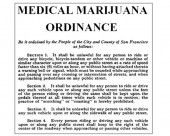Can cities and counties in California ban medical marijuana dispensaries, or should they be forced to regulate – rather than destroy – the industry if they have a problem with it?
The state Supreme Court will tackle that weighty question starting today when it begins hearings on a closely watched case that will address one of the biggest MMJ issues in California.
Its answer could reshape the state’s medical cannabis industry. More than 170 cities and counties across the state have enacted bans on medical cannabis dispensaries in the past few years, forcing hundreds of centers to close and preventing new ones from opening.
If the court rules in favor of the cities, then municipalities would have an easier time enforcing their bans, and more could follow suit. A ruling the other way, however, would breathe life back into the MMJ industry in many cities, paving the way for dispensaries to reopen, creating a more stable environment and removing a huge threat to the cannabis business community.
“The Supreme Court is going to bring clarity and uniformity to the law because we now have some courts of appeal that have ruled in favor of cities in these issues and some that have ruled in favor of medical marijuana dispensaries,” attorney T. Peter Pierce told the Long Beach Press-Telegram.
Cities with bans argue that federal drug laws supersede state medical cannabis legislation, which therefore gives them the ability to prevent dispensaries from operating. The MMJ industry and marijuana advocates say exactly the opposite, arguing that cities can set up regulations covering dispensaries – including zoning laws covering where they can locate – but not outright ban them.
“Local dispensary bans thwart the will of the electorate and the state legislature, and are therefore pre-empted by state law,” Joe Elford, chief counsel with the advocacy group Americans for Safe Access, said in a release.
Oral arguments tied to the case – titled The City of Riverside v. Inland Empire Patients Health and Wellness Center – will be held this morning (10:15 am Pacific time) at the University of San Francisco. You can watch the hearing live at http://www.calchannel.com. The court could issue a final ruling on the issue as early as spring.




